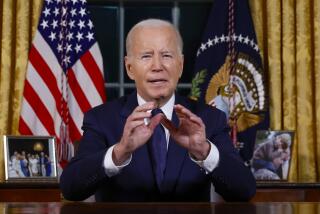Clinton Takes Offensive on Bosnia, Assails Critics’ ‘Simplistic Ideas’ : Policy: President says that unilaterally lifting arms embargo ‘would kill the peace process.’
- Share via
ANNAPOLIS, Md. — President Clinton used commencement at the Naval Academy on Wednesday as a platform for a sharp counterattack on critics of his Bosnia policy--including many leaders of his own party--accusing them of advancing “simplistic ideas that sound good on bumper stickers but that would have tragic consequences.”
The Clinton Administration’s policy, which relies heavily on multinational consultations and which critics deride as a failure to assert U.S. leadership, “is not quick; it is not neat; it is not comfortable,” Clinton conceded. “But I am convinced, in a world of interdependence where we must lead by working with others, it is the right path.
“Our Administration will not walk away from this Bosnian conflict. But we will not embrace solutions that are wrong,” the President said. “We plan to continue the course we have chosen--raising the price on those who pursue aggression, helping to provide relief to the suffering and working with our partners in Europe to move the parties to a workable agreement.”
In particular, Clinton denounced proposals that the United States unilaterally violate the U.N. embargo against arms shipments to the warring parties in Bosnia-Herzegovina, a course that many Democrats have endorsed and that has substantial congressional support.
Although Clinton has made that point several times before, his sharpened rhetoric marked an escalation of the war of words over Bosnia policy. The move reflects a realization by White House officials that Clinton needs to take a more active role in defending his foreign policies.
Clinton also repeated his insistence that Congress not make further cuts in the defense budget, an idea that congressional liberals have revived as lawmakers begin to face the hard choices on spending forced on them this year by tight budget caps.
Despite the President’s sometimes strained relations with the military, the Naval Academy graduates accorded Clinton and his speech polite applause.
Clinton also defended his overall approach of emphasizing multilateral action in most foreign arenas.
His critics, including several potential Republican presidential hopefuls, say that he has devalued traditional U.S. leadership by refusing to act alone when necessary.
But, Clinton said, while the United States must act unilaterally when its own immediate interests are at stake, many world crises require international cooperation.
“The end of the superpower standoff lifted the lid from a caldron of long-simmering hatreds,” he said. “Now the entire global terrain is bloody with such conflicts, from Rwanda to Georgia (in the former Soviet Union).
“We cannot solve every such outburst of civil strife or militant nationalism simply by sending in our forces. We cannot turn away from them. But our interests are not sufficiently at stake in so many of them to justify a commitment of our folks.”
In Bosnia, for example, the United States has interests at stake, Clinton said. They are not weighty enough to “warrant our unilateral involvement, but they do demand that we help to lead a way to a workable peace agreement if one can be achieved.”
Until recently, Clinton advisers shied away from having the President defend his positions on foreign issues, believing that the public would resent it if he spent time on overseas issues rather than on domestic policies.
But the Administration’s mood on that issue has shifted recently as polls have shown that public uncertainty about Clinton’s foreign policies has begun dragging down voters’ overall assessment of his ability.
The arms embargo has been a particularly difficult issue for the White House because Clinton agrees with critics who say that the main impact of the embargo has been to prevent the Muslim-led Bosnian government’s forces from obtaining enough weapons to defend themselves against Bosnian Serb rebels who receive arms through the neighboring republic of Serbia.
The Administration’s inability to persuade Britain, France and Russia--each of which has a veto in the U.N. Security Council--to lift the embargo has led members of both parties to call on Clinton to violate the ban unilaterally.
That issue has split both parties. The Senate, with the support of 13 Democrats, passed a measure earlier this month calling for lifting the embargo unilaterally. But earlier the same day it had approved another measure saying that the action should be taken only in consultation with allies. House leaders, facing similarly split sentiment, have been grappling with the issue as well but have postponed any votes until next month.
Clinton said that unilaterally lifting the embargo “would kill the peace process; it would sour our relationships with our European allies . . . and in the U.N. . . . it would undermine our efforts to enforce U.N. embargoes that we like such as those against (Iraqi dictator) Saddam Hussein, (Libyan dictator) Col. (Moammar) Kadafi and (Lt.) Gen. (Raoul) Cedras in Haiti.”
Times staff writer Michael Ross contributed to this story.
More to Read
Get the L.A. Times Politics newsletter
Deeply reported insights into legislation, politics and policy from Sacramento, Washington and beyond. In your inbox twice per week.
You may occasionally receive promotional content from the Los Angeles Times.











